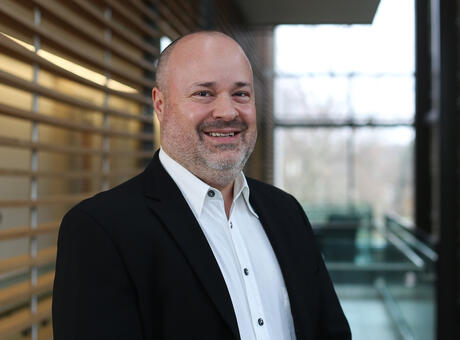New AI research award recipient supported by UFCW
One of the exciting, novel aspects of LLSC’s latest blood cancer research awards is the introduction of the Artificial Intelligence (AI) Catalyst Grant, for the application of AI to blood cancer research.
One of those AI grant recipients, Dr. Michael Rauh (shown here), Queen’s University, is also the 2024 UFCW Special Recognition Award recipient. The United Food and Commercial Workers’ (UFCW), which has contributed more than $50 million to LLSC for 39 years, annually supports one blood cancer researcher with this award. It's the passion of UFCW, its members, their families and communities that rally nationwide every year to raise critically needed funds for the blood cancer community. LLSC is proud to be the charity of choice for UFCW and its membership.
Dr. Rauh and his team won the grant for their work applying AI to the analysis of digital images of blood cells to detect clonal hematopoiesis, a condition known as CHIP.
A relatively recent cellular discovery, CHIP affects about 10% of the population over the age of 70. People with CHIP are not only at increased risk of blood cancers, but also for heart disease, lung disease, and many other diseases of inflammation.
As we age, stem cells in our bone marrow develop random mutations in their DNA. Some of these mutations do not have any effects, but certain mutations might cause the cells to start dividing more rapidly, sometimes leading to cancers like leukemia. Other times, cells don’t grow as fast; that is CHIP.
New way of detecting CHIP could save lives
CHIP can currently be diagnosed only through a genetic test, but since these tests are rarely done for the general population, most people go undiagnosed.
Most people, though, have had their blood drawn, and thousands of blood slides are looked at under the microscope daily. This leads to many blood cancers and other blood conditions being detected in people, sometimes long before symptoms develop.
“Since no changes in the appearance of blood cells have been described in CHIP so far, this large amount of data goes to waste,” says Dr. Rauh. “We want to apply artificial intelligence capable of looking at images to test the diagnostic capability for CHIP using blood slides. This may allow us to diagnose CHIP more easily and screen people for associated diseases or, in the future, treat them for CHIP.”
“As the amount of information grows dramatically, researchers now have an unprecedented chance to apply computation (AI) to produce new information and a deeper understanding of the disease,” says Dr. Paul O’Connell, Research Program Director, LLSC.
"We hope that this approach will find new ways to prevent blood cancers, improve survival through early detection, and develop more precise and effective treatments with fewer harmful side effects."
Learn more about this AI grant, and LLSC’s blood cancer research program.
